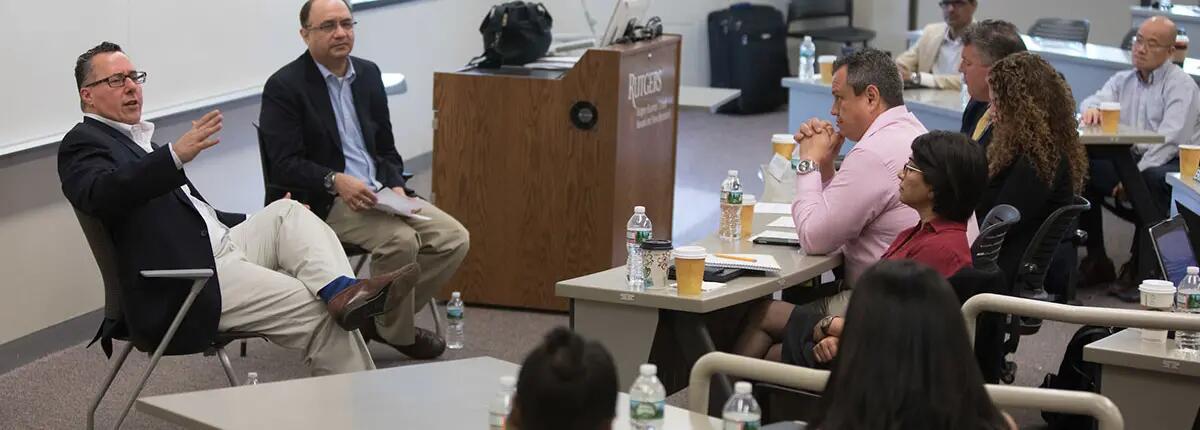Financial acumen is a key driver of the strategic decision-making process. Regardless of industry or function, high-level executives must fully understand areas such as Budgeting, Valuation, Cash Flow Maximization, Real Estate Finance, Implications of recent Fed policy and changes in Banking Regulations, Relationship Building and Hedge Fund Strategy. This elective deploys an optimal mix of distinguished in-house professors and veteran industry experts to present a finely balanced and constantly updated array of topics to our Executive MBA students.
The highly-experienced industry leaders include:
Lisa Kaplowitz: Assistant Professor of Professional Practice – Finance and Founding Director of the Center for Women in Business. Professor Kaplowitz is a former investment banker, Treasurer of Bed Bath & Beyond and CFO of various private equity backed retail and consumer products companies. She continues to advise executives, at all stages of growth, by using finance to help direct corporate strategy and decision making.
Dr. John Longo: Dr. Longo is Professor of Professional Practice, and Chief Investment Officer and Portfolio Manager for Beacon Trust, a registered investment advisor with $3 billion under management. Dr. Longo is also a Visiting Professor of Finance at EMBA Global – the joint international Executive MBA Program of Columbia University, London Business School and The University of Hong Kong. He is the bestselling author of The Art of Investing: Lessons from History’s Greatest Traders, published by TheGreatCourses.com. He has won a total of four awards for teaching and research excellence at Rutgers Business School. He has led the RBS student team to four research case competition championships organized by the CFA Society of New York. He has also led Rutgers to personal visits with Warren Buffett in Omaha, Nebraska on four separate occasions.
Fred Hoffman: Professor Hoffman was previously a Managing Director and the Head of Corporate Credit Strategies at Napier Park Global Capital (“Napier Park”). Professor Hoffman has managed almost all sectors of the fixed-income marketplace including ABS/MBS, Municipal Bonds, Interest Rate Products and Credit. Between 2004 and 2006, he was Deputy Chief Investment Officer of Northstar Financial Services of Hamilton, Bermuda. Professor Hoffman holds an MA in Econometrics from Fairleigh Dickinson University and a BA in Economics and Computer Science from Rutgers College, Rutgers University.
Darius Palia: Rutgers EMBA is fortunate to have Professor Darius Palia, the Thomas A. Renyi Endowed Professor of Banking at RBS, deliver two stand-alone sessions on "Fintech: Overview and Challenges" in the highly acclaimed 4th semester finance elective, Finance for the C-Suite. The confluence of Artificial Intelligence (AI), Blockchain, Cloud Computing and Big Data have yielded "FinTech". Not just startups, but established financial organizations, individuals, and even central banks will be increasingly driven by developments in FinTech in the very near future. In these sessions, Prof. Palia will conduct an overview of FinTech and then outline its immense potential utility and the challenges FinTech poses to traditional financial institutions and to regulators.
 Also included in this elective is extensive on-line training and familiarity with the Bloomberg Terminal. Bloomberg terminals are one of the main product offerings from Bloomberg L.P. They are one of the most heavily used and highly regarded professional investment systems to be created for the financial marketplace. You will find a Bloomberg terminal on almost every institutional financial professional's desk. Many EMBA students have Bloomberg at their desks already and find Professor Hoffman's usage and knowledge of the terminal to be exceptionally helpful.
Also included in this elective is extensive on-line training and familiarity with the Bloomberg Terminal. Bloomberg terminals are one of the main product offerings from Bloomberg L.P. They are one of the most heavily used and highly regarded professional investment systems to be created for the financial marketplace. You will find a Bloomberg terminal on almost every institutional financial professional's desk. Many EMBA students have Bloomberg at their desks already and find Professor Hoffman's usage and knowledge of the terminal to be exceptionally helpful.
Atul Prashar: Venture Capital is an effective tool to reduce the friction from ideation to invention, with the main goal of unlocking tremendous value for the consumer and generating scalable profits for the company. In this session, we focus on the qualitative side of VC, storytelling (the who, what, how, and why you?). A founder guides investors through a structured Story, utilizing Data (establishing & proving addressable market), proving their product or service solves a current market gap, and why they are the best to execute this plan. This framework arms investors with the proper knowledge to use their imagination to envision the company’s market success 2, 5, and 10 years into the future. The session will begin with an explanation of capital deployment from a $100 million fund, followed by the Professor’s “Walk Me Through a Deal” scenarios, depicting real-world examples of why some of his deals were successful and what led to failure on others.

 Also included in this elective is extensive on-line training and familiarity with the Bloomberg Terminal.
Also included in this elective is extensive on-line training and familiarity with the Bloomberg Terminal. 
